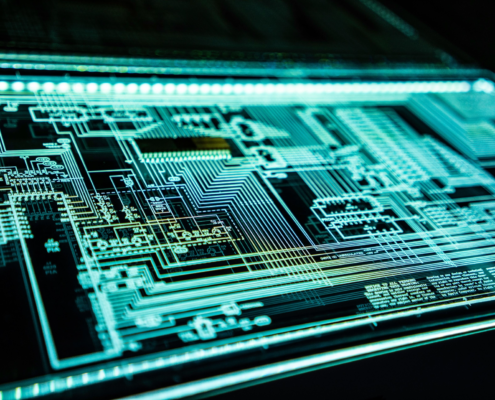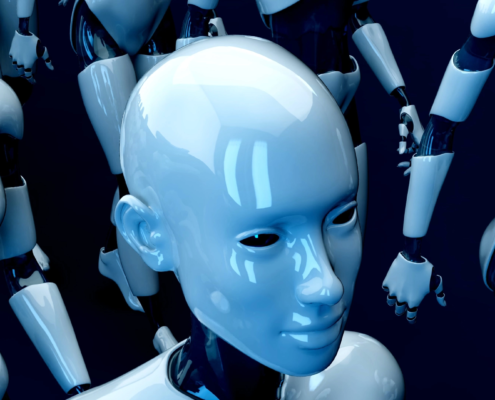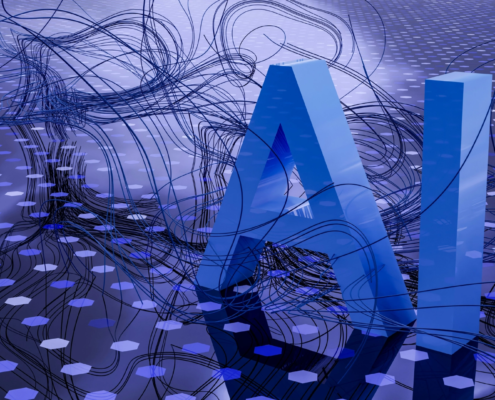AI: revolutionizing technology and society
Artificial intelligence (AI) has made immense progress in recent years and is beginning to profoundly change both technology and society.
Revolutionizing the technology
Artificial intelligence is the engine of a new technological era.
Through the use of machine learning and deep neural networks, systems can now perform tasks that were previously the sole preserve of humans.
Examples include speech recognition, image processing and autonomous vehicles.
These technologies are able to analyze huge amounts of data in real time and make precise predictions or decisions.
One notable example is the healthcare sector, where AI-supported diagnostic tools help doctors to detect diseases at an early stage and develop customized treatment plans.
AI also enables the automation of complex processes in industry, which increases efficiency and reduces costs.
Another area where AI is revolutionizing technology is robotics.
Advances in AI mean that robots can now not only perform simple, repeatable tasks, but also work in dynamic and unstructured environments.
These capabilities open up new possibilities in areas such as disaster relief, exploration and even everyday household tasks.
Overall, AI is driving innovation and creating entirely new possibilities that are fundamentally changing our technological landscape.
Revolutionizing society
In addition to technological changes, AI also has a profound impact on society.
One of the most notable aspects is the transformation of the world of work.
While automation and intelligent systems could replace many traditional jobs, new occupational fields and opportunities are emerging at the same time.
However, this requires education systems to adapt in order to equip people with the necessary skills for the future.
Lifelong learning and further training are becoming increasingly important in order to survive in the rapidly changing labor market.
In addition, AI is changing the way we interact and communicate.
Social media and digital platforms use AI to personalize content and improve the user experience.
However, this also brings challenges, such as the protection of privacy and control over personal data.
Society is faced with the task of creating ethical and legal frameworks that ensure the responsible use of AI.
Finally, AI has the potential to tackle global problems such as climate change.
By optimizing resources and improving predictive models, AI can contribute to the development of sustainable solutions.
However, it is crucial that these technologies are accessible and used fairly in order to benefit all people and not reinforce social inequalities.
Overall, AI offers enormous opportunities, but also requires careful management and conscious design in order to fully exploit its benefits and minimize potential risks.
Tag Archive for: AI
 https://bitkollegen.de/wp-content/uploads/2024/01/BitKollegen-Blog-KI-Gesundheitswesen.webp
1279
1920
Florian
https://bitkollegen.de/wp-content/uploads/2024/01/logo-bitkollegen-680x312-1.webp
Florian2024-04-24 11:56:462024-07-23 23:09:35Revolutionizing healthcare: The impact of AI on medical diagnoses and treatments
https://bitkollegen.de/wp-content/uploads/2024/01/BitKollegen-Blog-KI-Gesundheitswesen.webp
1279
1920
Florian
https://bitkollegen.de/wp-content/uploads/2024/01/logo-bitkollegen-680x312-1.webp
Florian2024-04-24 11:56:462024-07-23 23:09:35Revolutionizing healthcare: The impact of AI on medical diagnoses and treatments https://bitkollegen.de/wp-content/uploads/2024/01/BitKollegen-Blog-KI-Nachhaltigkeit.webp
1281
1920
Florian
https://bitkollegen.de/wp-content/uploads/2024/01/logo-bitkollegen-680x312-1.webp
Florian2024-04-04 13:00:012024-07-23 23:11:27Sustainability through AI: potential and limits in the world of work
https://bitkollegen.de/wp-content/uploads/2024/01/BitKollegen-Blog-KI-Nachhaltigkeit.webp
1281
1920
Florian
https://bitkollegen.de/wp-content/uploads/2024/01/logo-bitkollegen-680x312-1.webp
Florian2024-04-04 13:00:012024-07-23 23:11:27Sustainability through AI: potential and limits in the world of work https://bitkollegen.de/wp-content/uploads/2024/01/BitKollegen-Blog-KI-Finanzsystem.webp
1280
1920
Florian
https://bitkollegen.de/wp-content/uploads/2024/01/logo-bitkollegen-680x312-1.webp
Florian2024-03-22 10:04:332024-07-23 23:12:39The role of AI in the financial sector: risks and opportunities
https://bitkollegen.de/wp-content/uploads/2024/01/BitKollegen-Blog-KI-Finanzsystem.webp
1280
1920
Florian
https://bitkollegen.de/wp-content/uploads/2024/01/logo-bitkollegen-680x312-1.webp
Florian2024-03-22 10:04:332024-07-23 23:12:39The role of AI in the financial sector: risks and opportunities https://bitkollegen.de/wp-content/uploads/2024/01/BitKollegen-Blog-KI-Bildung.webp
1080
1920
Florian
https://bitkollegen.de/wp-content/uploads/2024/01/logo-bitkollegen-680x312-1.webp
Florian2024-03-18 15:12:422024-07-23 23:13:00Artificial intelligence in the education sector: opportunities and challenges
https://bitkollegen.de/wp-content/uploads/2024/01/BitKollegen-Blog-KI-Bildung.webp
1080
1920
Florian
https://bitkollegen.de/wp-content/uploads/2024/01/logo-bitkollegen-680x312-1.webp
Florian2024-03-18 15:12:422024-07-23 23:13:00Artificial intelligence in the education sector: opportunities and challenges https://bitkollegen.de/wp-content/uploads/2024/01/BitKollegen-Blog-KI-Arbeit.webp
1280
1920
Florian
https://bitkollegen.de/wp-content/uploads/2024/01/logo-bitkollegen-680x312-1.webp
Florian2024-03-09 18:48:372024-07-23 23:13:05The future of work: How AI is changing our working world
https://bitkollegen.de/wp-content/uploads/2024/01/BitKollegen-Blog-KI-Arbeit.webp
1280
1920
Florian
https://bitkollegen.de/wp-content/uploads/2024/01/logo-bitkollegen-680x312-1.webp
Florian2024-03-09 18:48:372024-07-23 23:13:05The future of work: How AI is changing our working world https://bitkollegen.de/wp-content/uploads/2024/01/BitKollegen-Blog-App-KI.webp
1080
1920
Florian
https://bitkollegen.de/wp-content/uploads/2024/01/logo-bitkollegen-680x312-1.webp
Florian2024-03-01 17:15:412024-07-23 23:13:41Low-code and AI: Are they revolutionizing app development?
https://bitkollegen.de/wp-content/uploads/2024/01/BitKollegen-Blog-App-KI.webp
1080
1920
Florian
https://bitkollegen.de/wp-content/uploads/2024/01/logo-bitkollegen-680x312-1.webp
Florian2024-03-01 17:15:412024-07-23 23:13:41Low-code and AI: Are they revolutionizing app development? https://bitkollegen.de/wp-content/uploads/2024/01/BitKollegen-Blog-KI-Gesundheitswesen.webp
1279
1920
Florian
https://bitkollegen.de/wp-content/uploads/2024/01/logo-bitkollegen-680x312-1.webp
Florian2024-04-24 11:56:462024-07-23 23:09:35Revolutionizing healthcare: The impact of AI on medical diagnoses and treatments
https://bitkollegen.de/wp-content/uploads/2024/01/BitKollegen-Blog-KI-Gesundheitswesen.webp
1279
1920
Florian
https://bitkollegen.de/wp-content/uploads/2024/01/logo-bitkollegen-680x312-1.webp
Florian2024-04-24 11:56:462024-07-23 23:09:35Revolutionizing healthcare: The impact of AI on medical diagnoses and treatments https://bitkollegen.de/wp-content/uploads/2024/01/BitKollegen-Blog-KI-Nachhaltigkeit.webp
1281
1920
Florian
https://bitkollegen.de/wp-content/uploads/2024/01/logo-bitkollegen-680x312-1.webp
Florian2024-04-04 13:00:012024-07-23 23:11:27Sustainability through AI: potential and limits in the world of work
https://bitkollegen.de/wp-content/uploads/2024/01/BitKollegen-Blog-KI-Nachhaltigkeit.webp
1281
1920
Florian
https://bitkollegen.de/wp-content/uploads/2024/01/logo-bitkollegen-680x312-1.webp
Florian2024-04-04 13:00:012024-07-23 23:11:27Sustainability through AI: potential and limits in the world of work https://bitkollegen.de/wp-content/uploads/2024/01/BitKollegen-Blog-KI-Finanzsystem.webp
1280
1920
Florian
https://bitkollegen.de/wp-content/uploads/2024/01/logo-bitkollegen-680x312-1.webp
Florian2024-03-22 10:04:332024-07-23 23:12:39The role of AI in the financial sector: risks and opportunities
https://bitkollegen.de/wp-content/uploads/2024/01/BitKollegen-Blog-KI-Finanzsystem.webp
1280
1920
Florian
https://bitkollegen.de/wp-content/uploads/2024/01/logo-bitkollegen-680x312-1.webp
Florian2024-03-22 10:04:332024-07-23 23:12:39The role of AI in the financial sector: risks and opportunities https://bitkollegen.de/wp-content/uploads/2024/01/BitKollegen-Blog-KI-Bildung.webp
1080
1920
Florian
https://bitkollegen.de/wp-content/uploads/2024/01/logo-bitkollegen-680x312-1.webp
Florian2024-03-18 15:12:422024-07-23 23:13:00Artificial intelligence in the education sector: opportunities and challenges
https://bitkollegen.de/wp-content/uploads/2024/01/BitKollegen-Blog-KI-Bildung.webp
1080
1920
Florian
https://bitkollegen.de/wp-content/uploads/2024/01/logo-bitkollegen-680x312-1.webp
Florian2024-03-18 15:12:422024-07-23 23:13:00Artificial intelligence in the education sector: opportunities and challenges https://bitkollegen.de/wp-content/uploads/2024/01/BitKollegen-Blog-KI-Arbeit.webp
1280
1920
Florian
https://bitkollegen.de/wp-content/uploads/2024/01/logo-bitkollegen-680x312-1.webp
Florian2024-03-09 18:48:372024-07-23 23:13:05The future of work: How AI is changing our working world
https://bitkollegen.de/wp-content/uploads/2024/01/BitKollegen-Blog-KI-Arbeit.webp
1280
1920
Florian
https://bitkollegen.de/wp-content/uploads/2024/01/logo-bitkollegen-680x312-1.webp
Florian2024-03-09 18:48:372024-07-23 23:13:05The future of work: How AI is changing our working world https://bitkollegen.de/wp-content/uploads/2024/01/BitKollegen-Blog-App-KI.webp
1080
1920
Florian
https://bitkollegen.de/wp-content/uploads/2024/01/logo-bitkollegen-680x312-1.webp
Florian2024-03-01 17:15:412024-07-23 23:13:41Low-code and AI: Are they revolutionizing app development?
https://bitkollegen.de/wp-content/uploads/2024/01/BitKollegen-Blog-App-KI.webp
1080
1920
Florian
https://bitkollegen.de/wp-content/uploads/2024/01/logo-bitkollegen-680x312-1.webp
Florian2024-03-01 17:15:412024-07-23 23:13:41Low-code and AI: Are they revolutionizing app development?